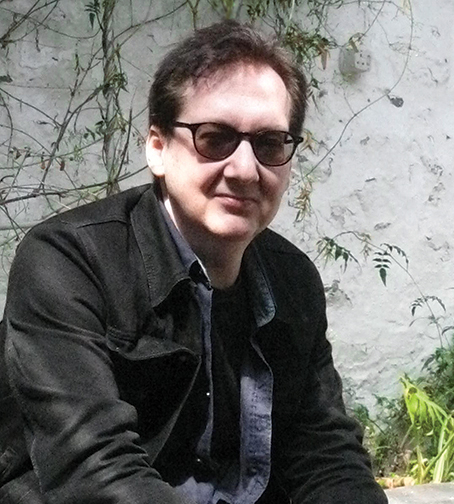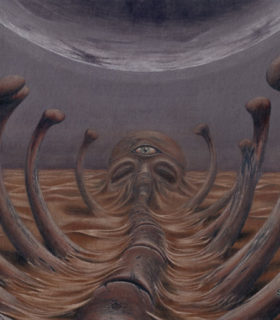Steve Aylett first came to my attention when I picked up a copy of Shamanspace, a book about two rival occult groups in a competition to see who could be the first to kill god. Shamanspace was written in a sort of crypto-cyberpunk tongue, which was both hilarious and entertaining. Being that I ran in similar digital circles, this was all too familiar to me. It turned out that Aylett had just released a new book titled Heart of the Original which was also quite relevant to my interests. I decided to interview him about his recent pursuits.
Rachel Haywire: Let’s start with Shamanaspace. Where did you get the idea to write this book? What inspired it? Was it based in reality?
Steve Aylett: It makes sense that if god was found to exist and that it was responsible for setting everything up, revenge upon it would be reasonable. If it was woven throughout everything in the universe, then the assassins would constitute its suicide urge, and the universe would end upon termination - a small price to pay.
In your new book Heart of the Original, you discuss various ways in which we can revive authenticity in a society that is so utterly manufactured. If you had to sum it up for Trigger Warning readers, what do you think is the best thing we can do to bring forth a resurgence of authenticity?

I summed it up on page 23 of the book in case anyone hadn’t twigged by then. “Free of fashion or lobbying, the authentic from-the-ground-up thought of the individual births the original.” It’s useful not to be stuck to the temporal floor, to not let the times waste your time. Many people find that position incomprehensible or at best unlikely.
In Heart of the Original you talk about manufactured surprises. You aptly describe how people wish to have fake surprises handed to them that they already know about. What do you think are the symptoms of this, and do you believe there is anything we freethinkers can do to shift this mass frame of mind?
At its simplest it’s Building Seven Syndrome - just wanting to join in. But at a more harmful level it’s about a resistance to learning anything and thus having to do something about what you’ve learned. Just act surprised by the same thing over and over, announce the same breakthroughs every few decades, and so on.
There was a study announced a few weeks ago which showed that Finnegans Wake was designed as a fractal. Terence McKenna talked about this (Surfing on Finnegans Wake) a few decades ago. I don’t know how many times this can be legitimately termed a revelation. I’ve never used that structure in my books though. After the philosophical parkour of Heart of the Original you can hold the whole thing in your head as a mandala or ideogram - the joinery of it’s quite precise, including several references to how it works.
Anyway at maybe the most toxic level, people participate in mass activities which cause personal or planetary harm at a remove, and it’s easy to pretend we’re not sharing in the responsibility. I do it too. There’s cowardice in numbers. But it shows the ultimate hen-heartedness to be timid of mere new ideas. It’s got to the point where people are openly admitting it, as if having no mind or heart of their own isn’t something to be ashamed of.
I live in the UK, a mean little country which is now devouring itself, but it might be a more general trend. It seems that society, like nature, doesn’t like anything which is singular, preferring things which can be reproduced and generalised. But in society and in nature, those singular events are not only the most interesting things going on, they’re also the mutations which propel evolution. I don’t know whether or not a mass position has to be conscious to qualify as a conspiracy – a lot of things regarded as conspiracy are people having the same idea to move in a certain direction, and being bastards in parallel.
The initial resistance to original ideas seems something like that, but when it’s so extreme and sustained as at present, exhibiting such fear, the most generous observation can be that it’s artificial and consciously directed. Politically induced, in other words. The culture is now so hostile to the authentic, raw origination of ideas it looks downright suspicious. Is freezing evolution a good idea?
Authentic people, as you mentioned, are often scorned by society. Meanwhile our ideas are adapted later, by the same people who previously ostracized us. It there anything we can do to bypass the scorning and get right to the acceptance, considering that our ideas are going to be adapted by mass culture anyway?
That initial resistance is traditionally a means to disengage a new idea from the person who came up with it, partly so that it can be treated as a notion that just coalesced from all directions and partly to avoid the obligation for gratitude or payment to the actual originator, who will ideally be dead. But beyond this traditional procedure is the more primal fear of true originality, which will find no pre-rendered receptor in the mind because it has never, ever been encountered before.
We can have some sympathy for people who are exhausted by work and life and don’t have even the small energy available to form a new receptor for the new idea - and we can be certain that they will have no sympathy for the exhaustion of those who crave or create such ideas, especially if such original thinkers are their children. It can be especially awkward if a child or adult goes about fomenting common sense while also being creative and imaginative. This can come from a very developed corpus callosum which links the halves of the brain so that imagination and practicality are in communication, da Vinci style.
That fuller communication messes up the usual binary stereotypes, presenting onlookers with the nasty prospect of having to think about what’s happening. This is all unwelcome in a populace which is mainly just trying to get through the day with a minimum of discomfort. You’re treated like a criminal if your mind is the equivalent of a controlled substance. Only you know if you are ready to interact with the world as yourself or as an adjusted avatar. You may not be able to make the moves you need to make if you are beholden. But you know your energy levels and when it’s time to hide out. For specific ideas it’s worth trying the technique of pretending that a new notion is old so as to make it easier for people to accept - Heart of the Original uses that technique from the very first sentence. Credit your idea to someone who lived at least a hundred years ago. It will reassure people that some or all of the acceptance-delay period has elapsed and that it’s now okay to think about and use.
How do you feel about censorship and political correctness? Do you think this behavior is a way to weed out dissenting opinions, or do you believe that there is a genuine reason to censor ideas that are considered to be offensive?
I think most people can field and filter their own perceptions but there’s nothing wrong with being caring around a friend who you know has a sensitivity to something. No need to be a dick.
Do you plan on writing anything new? What would you like to do in the next few years? Tell us about your future plans.
There are five books in a holding pattern waiting for permission to land but I doubt I’ll give permission any time soon. In Heart of the Original, I wondered about how long an organism could continue to live if it was constantly putting out energy while receiving nothing back. Could anything keep pouring energy into a vacuum for, say, a couple of decades or more?
There is a cute nozzle-mouthed animal called a tardigrade which, when it finds itself in an environment totally hostile to life, goes into complete hibernation, with no detectable life signs, waking again in better conditions. They can exist lifeless for years, as a way of saving their lives. Scientists sent some into space and the tardigrades, sensing that they were trying to thrive in an absolute vacuum, went into total hibernation.
That being more or less the situation I find myself in, I’m going to hibernate and be private for several years. When the tardigrades were brought back into a liveable environment they came to life again. I don’t expect the culture to become more fertile, so the conditions for me publishing again will be personal, not about the environment. Meanwhile I’ll be a frightening party clown or some sort of mutant lobster that clings to the side of buildings.

